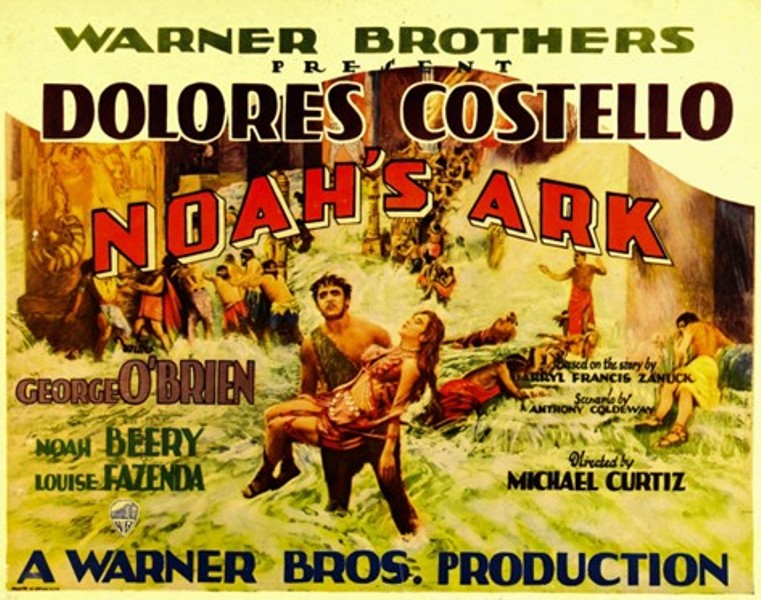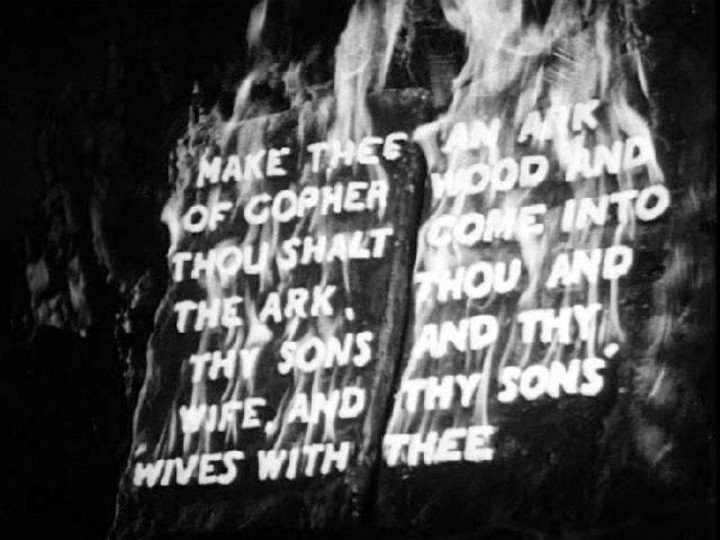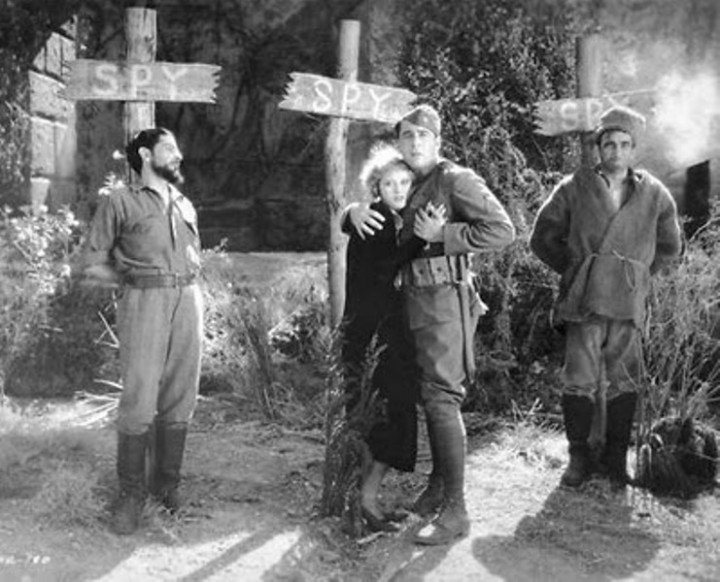Darren Aronofsky wasn’t the first to make a movie spectacle out of Noah and his floating zoo. No, that honor goes to Michael Curtiz, Darryl F. Zanuck, and Warner Bros. way back in 1928 with Noah’s Ark — an it probably isn’t anymore scripturally accurate than Mr. Aronofsky’s fantasticated take on the same material. It is perhaps best known today — in a notorious way — as the movie where they managed to drown at least three extras and injure considerably more. (Cinematographer Hal Mohr walked off the film because he felt — accurately, as it turned out — that flood scenes the technicians had in mind were fine for stuntmen, but extremely dangerous for unskilled extras.) Of course, the real reason it’s mostly just a footnote in movie history is that it’s one of those hybrid part-talkies that studios traded in at the dawn of sound. The advertising encouraged viewers to “see and hear the spectacle of the ages,” which wasn’t entirely true, since — apart from music and sound effects — the movie is mostly silent and none of its Biblical scenes have talking scenes. Oh, yeah, that’s the other thing — somewhat less than half of the movie is about Noah’s Ark. Most of the first half is given over to a WWI story that is rather clumsily meant to work as an allegory — the world drowning in blood rather than a literal Biblical deluge. All of this taken into consideration, however, Noah’s Ark isn’t just a fascinating curio from a very bygone era, it’s surprisingly entertaining — and it is most certainly a spectacle of note.
The project was dreamed up by future movie mogul Zanuck, who would found 20th Century Pictures in 1934 and would acquire Fox Films in 1936 to create 20th Century Fox. At this point in his career he was more a scenario writer for Warner Bros., who had recently started producing. (It is my belief that Warners moved him more and more into producing to keep him from writing.) Zanuck saw the concept as a vehicle for then popular Dolores Costello — who also at the time was Mrs John Barrymore and who we know today primarily as Drew Barrymore’s grandmother. Zanuck had already placed Ms. Costello at the center of the San Francisco earthquake in Old San Francisco in 1927. It, too, was a spectacle, so Noah’s Ark probably seemed a logical choice. The similarities do not end there. In Old San Francisco Zanuck’s story suggests that God brought on the earthquake in order to save Ms. Costello’s virtue from nefarious half-caste Warner Oland. Well, God gets back into the act here — saving her from the equally nefarious Noah Beery, not once, but twice. When Beery’s Russian secret service agent is about to have her shot by a firing squad, God shells the place. Later when Beery’s Old Testament King is about to have her sacrificed to his pagan god, God zaps his archer’s with lightning bolts before flooding the court. The lesson here is clear — one does not mess with Dolores Costello.
Apparently realizing that the Noah story presented in “Genesis” was a little thin for a feature film — even after borrowing Moses’ burning bush and having God tell Noah (Paul McAllister) about the flood and the ark via a book of flaming stone tablets. So, borrowing Cecil B, DeMille’s approach to the 1923 The Ten Commandments, Zanuck cooked up a modern “parallel” story about how corrupt modern times (1914 variety) had become, leading us into a WWI story that takes up slightly more than half of the running time. Apart from the pre-war set-up establishing the man characters — all of whom appear as charcters in the Noah tale — the war story is fairly standard stuff made more interesting by Curtiz’s direction, which is better than the story. One of the more fringe characters is a minister with an Old Testament beard (which makes it easy for the actor to transition into playing Noah). It is he who will spin out the story of the Ark to the survivors of the shelling that saved Ms. Costello’s life, but which has trapped them in some subterranean structure.
Surprisingly, most of this works pretty well — even when it wanders into the realm of cliches. Ms. Costello makes an agreeable heroine in both stories and George O’Brien is a reasonable hero. (But don’t look for anything remotely like the performance he gave for F.W. Murnau in Sunrise: A Song of Two Humans the previous year.) Otherwise, the cast — except for the delicious villainy of Noah Beery — is mostly adequate. The talking sequences are much better than those in most of the hybrid movies of the era, but apart from the long-vanished novelty value of actors speaking don’t add very much. The music and sound effects, however, are definitely a plus — though the love song, “Heart of Mine,” is a bit much. (Fortunately, as a song, it’s mostly limited to the film’s overture and exit music, though the theme crops up fairly often in the body of the movie.) This kind of theme song was fairly common to the era, but the feel awkward today.
The film’s climax — which I’m sure was utterly sincere — now seems remarkably naive. At the time, however, a lot of people generally believed that WWI was indeed “the war to end all wars.” We know better now. In a way, that makes the then uplifting ending come across as inexressibly sad. All in all, Noah’s Ark is much better than its obscurity and somewhat lackluster reputation (mostly derived from screenings of poor quality and often cut prints) might suggest. See it for yourself. If nothing else, you’ve never seen anything quite like it.
The Asheville Film Society will screen Noah’s Ark Tuesday, May 6, at 8 p.m. in Theater Six at The Carolina Asheville and will be hosted by Xpress movie critics Ken Hanke and Justin Souther.









Before you comment
The comments section is here to provide a platform for civil dialogue on the issues we face together as a local community. Xpress is committed to offering this platform for all voices, but when the tone of the discussion gets nasty or strays off topic, we believe many people choose not to participate. Xpress editors are determined to moderate comments to ensure a constructive interchange is maintained. All comments judged not to be in keeping with the spirit of civil discourse will be removed and repeat violators will be banned. See here for our terms of service. Thank you for being part of this effort to promote respectful discussion.